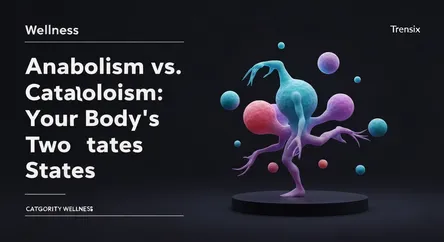Wellness
Anabolism vs. Catabolism: Your Body's Two States

Learn the difference between anabolism (building) and catabolism (breaking down) to optimize your fitness, nutrition, and overall wellness goals.
What is it?
Anabolism and catabolism are two opposing yet complementary processes of your metabolism. Anabolism is the "building up" phase, where your body uses energy to construct complex molecules from simpler ones. Think of it as building muscle tissue after a workout or healing a wound. This process requires energy (ATP) and is supported by hormones like insulin and testosterone. Catabolism, on the other hand, is the "breaking down" phase. It releases energy by deconstructing complex molecules like fats and carbs into smaller units. Digestion is a primary example of a catabolic process. Both are essential and constantly at work to keep your body functioning.
Why is it trending?
The concept is gaining traction in fitness and nutrition because it offers a more nuanced approach than just counting calories. Understanding whether your body is in a building (anabolic) or breaking down (catabolic) state helps people tailor their workouts and diet to specific goals. Those looking to build muscle aim to maximize their time in an anabolic state through resistance training and proper nutrition. Conversely, those focused on fat loss leverage catabolic processes through aerobic exercise. This bio-hacking approach empowers individuals to work smarter with their body's natural metabolic cycles for more effective results in body composition.
How does it affect people?
Understanding this balance directly impacts fitness results. To build muscle, you need to be in an anabolic state, which is achieved through strength training (an anabolic exercise) and consuming enough protein and calories. To lose fat, you encourage a catabolic state through activities like running or cycling, which break down stored fuel for energy. Nutrition plays a key role; adequate protein intake promotes anabolism, while fasting or low-calorie diets induce catabolism. Hormones are also crucial; managing stress to control the catabolic hormone cortisol and getting enough sleep to promote anabolic growth hormone are practical applications of this knowledge for everyday health.